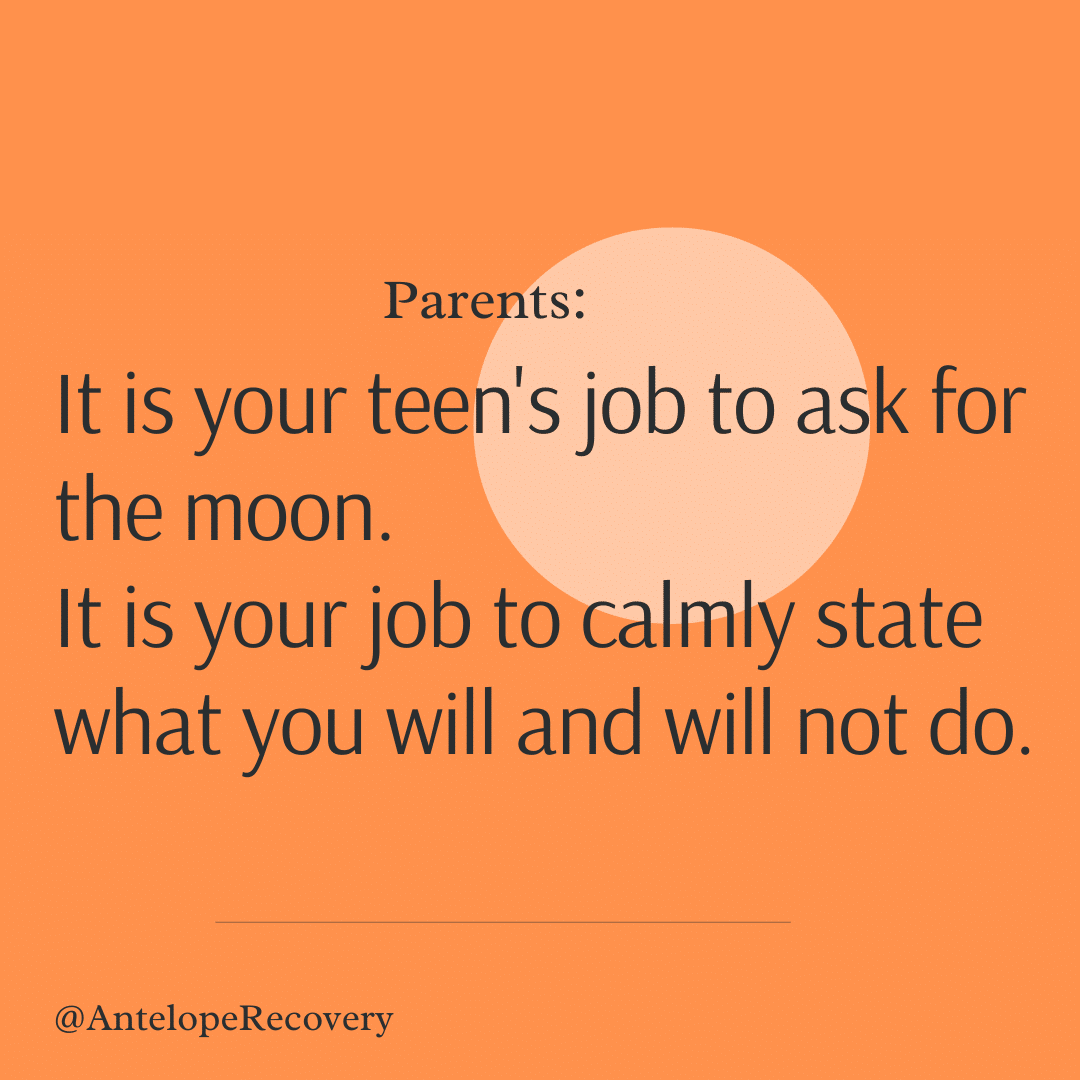The goal of parenting teens is to create responsible adults who are equipped with tools that will enable them to make wise choices throughout life.
Responsible teens feel good about themselves.
- Self-esteem doesn’t just “happen.” You can’t wish it into being. It has to be earned.
- The superficial stuff (appearance, clothes, looks) does not ensure your teen will have high self-esteem. In fact, appearance changes can often cover up insecurity.
- Teens develop their self-identity and self-esteem by being allowed to make and follow through with their decisions using their sweat and blood.
- We can’t teach responsibility through lectures, threats, or intimidation (see Drill Sergeant Parent)
- We can’t teach responsibility if we’re constantly on a rescue mission on our teen’s behalf (see Helicopter Parent)
- We teach teens responsibility through the small ways we allow opportunities for teens to develop themselves.
The best way we can do this is by allowing teens to own their problems and the solutions to those problems. Teens who enter into adulthood knowing “I can find solutions to the problems in my life” have an edge.
Support your teen in taking responsibility.
- Ask your teen about their problems with loving curiosity
- Guide them in finding solutions to their own problems
- Offer them choices
- Make suggestions
The best solution for the problem lies inside the person who created the problem. If teens are going to learn how to make responsible choices, they need to learn how to live with their bad decisions.
Four Steps to Responsible Teens
- Give your teen a responsibility (such as negotiating their curfew or monitoring their own technology time)
- Trust they will carry it out (but secretly hope they’ll blow it)
- When they do blow it, express empathy, stand back, and allow consequences to occur
- Turn around and give responsibility all over again. They hear, “You are so smart, you can learn and figure this out,” when we do this.
When we say “allow consequences to occur,” we mean…
As a parent, you have your limits. If you are taking your teen’s behavior seriously, you must stand by your limits and follow through with enforcing them.
Wishes vs Limits
- Wishes —> When we make a wish, it is usually about everything we want to be different about our teen’s behavior. This is not helpful and is very painful for our teens. It is also impossible for us to enforce a wish. Wishing reduces our integrity and our word, and our teens respect us less when we do it.
- “I wish you would stop yelling.”
- “I wish you’d finish your homework.”
- Limits → Limits, on the other hand, turn our word into gold. Limits are all about me and my personal integrity. In short, they describe what we are and are unwilling to do. Some examples:
- “I’ll gladly listen to you once your voice is as soft as mine. Take your time getting there. I’ll see you later.”
- If the teen screams, “I need to figure this out now, though, or I could get fired!”
- You can relax and respond with “Probably so.”
- “But I’ll never see my work friends again!!”
- “Probably so.”
- When you get angry – you strip the consequence of its power. Relax. Let your limits serve as natural consequences for your teen. They will figure it out.
- “I’ll be happy to discuss this as soon as the arguing stops.”
- “I’ll gladly listen to you once your voice is as soft as mine. Take your time getting there. I’ll see you later.”

Accountability
After you share your limits, you then hand the problem back to the teen. Here, it is important we don’t rescue teens from how painful the consequences of their decisions are. We let them figure out how to move on and where to go next.
Examples:
- “Oh, no. That’s got to feel ___________. What do you think you are going to do?“
- “Take your time in figuring this one out! It’s no problem for me.”
- “If I were in your shoes, I might consider this…. but I’m sure you’ve got this figured out on your own. Good luck!”
- “Let me know if you need anything here. In the meantime, I’ll be cooking dinner.”
- “I know this is important to you, so I’m sure you’ll figure out where to go from here.”
One way you can help your teen to own their problems is to express sorrow instead of anger.
- “Oh, I felt sorry for you last night. I smelled alcohol on your breath. I’m starting to worry about your drinking. What would you guess about using the car now?”
Clear communication with your teen
Don’t tell your teen what to do – this robs your teen of opportunities to grow up and usually doesn’t work.
Instead, tell them what you are going to do.
When children grow into teens, we suddenly cannot tell them what to do anymore as parents. The truth is we can’t force them to do anything – just like you can’t force any other adult in your life to do anything. However, we can tell them what we will do in response to their actions.
Often, when we tell teens what to do, they clamp down. They think we are trying to control them. They start thinking, “You will never control me!! I will get my way!”. This is often paired with deep sadness for teens. When we try to control our teenagers, not only are their needs not being met, but they feel like they must be seen as stupid or fragile; otherwise, in their eyes, we would let them handle it. They want to be responsible.
We want consequences to hurt from the inside out, not the outside in. When we come down on them, it only allows them to blame us rather than to grow. If they are burdened with coming up with their own solutions, they will feel the “hurt” from the inside.
Often, our attempts at controlling our teens look like us using fighting words. Fighting words are like tinder on an already burning flame. Avoid using these!
Fighting words: Don’t call your teen to battle
- When we tell our teens what to do (”Clean your room, now”)
- When we tell our teens what we will not allow (”I won’t let you hang out with those kids that smoke pot on the corner.”)
- When we tell our teens what we won’t do for them (”I’m not driving you until you finish your homework.”)
Thinking words: Call your teens into responsibility
- What we will allow (Feel free to join us for dinner as soon as your room is clean.)
- What we will do (I will drive you if you choose to finish your homework)
- What we will provide (I’m happy to let you use the car tonight if we can discuss your smoking. I’m worried about you.)
- Our preferences (I’d appreciate it if you lowered your voice.)
You can do this, parents! Go slow, and know that these skills take practice. Raising responsible teens is 100% worth the initial discomfort and fear of relaxing and letting go.
Need help with your teen?
Antelope Recovery is here to be your partner in your teen’s journey towards a healthier and more responsible life. Our comprehensive programs, including teen groups, family therapy, and individual therapy, are designed to provide the care and guidance necessary to make lasting change. Contact us today to explore how our services can make a meaningful difference in your teen’s experience of themself and their orientation to life. Your family’s path to healing and hope begins with Antelope Recovery.


